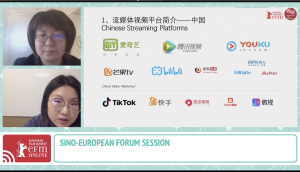With the Venice International Film Festival kicking off this week, Pinta Studios is showcasing its latest Virtual Reality (VR) animated film ‘The Dream Collector’ in competition with other 21 VR works from around the world.

Along with three other films made in Chinese (two from Mainland China and one from Taiwan), The Dream Collector is one of 22 finalists nominated at Venice Film Festival in VR section, which is the festival’s first-ever competition for films made in VR.
Last year China saw explosive growth in the VR sector, but by the end of the year there had been talks in the industry saying that the sector had “frozen.” However, figures show that with more major players entering the sector, the country’s VR industry is expected to expand more than fourfold in 2017 as competition intensifies and the market becomes more diverse, according to research firm IDC’s forecast released this January.
“We will be more dependent on VR devices than we are our phones today,” predicted Alvin Wang Graylin, China Regional President of HTC Vive, earlier this month. He also suggested that “remote work via VR will become the norm.”
VR technology has indeed been widely implemented in China, with CCTV, China’s state-owned media, adopting VR technology to broadcast Spring Festival Gala and basketball matches powered by a Beijing-based VR production startup. Also, as of 2016 Q3, China had over 5,000 offline VR experiential stores, and more stores will open and be accessible in lower-tier Chinese cities, IDC’s report suggested.
“We tell stories that audience can relate to, something more down-to-earth,” Lei Zhengmeng, Pinta Studios’ co-founder and CEO, told TechNode. “Our story [of ‘The Dream Collector’] is very much similar to those of the mainstream animation movies. You can easily understand the story,” he said.
The 12-minute animation depicts the story of an old man and his playful dog. They live together in a garbage dump, where they spend days sorting through abandoned trash, such as a broken guitar, a torn baseball glove, and a deflated soccer ball—objects that they see as “abandoned dreams.” They collect the items, fix them and hopefully return them.
Yes, this is a typical three-act structured film, which divides a fictional narrative into three parts—the setup, the confrontation, and the resolution. This is a storytelling style that can form a more complete and engaging watching experience, which is widely used in Hollywood movies.
“It’s not super long but it is very ‘visually effective,’” said Lei. “We didn’t put in too much ‘magical’ effects but tried to create something that’s more physically possible. This old man isn’t a superman but an ordinary guy.”
Founded in June 2016, Pinta Studios only one month later pocketed RMB 6 million (about $909,000) in angel financing (in Chinese). Lei Zhengmeng, formerly working at Alibaba’s digital entertainment department, quickly assembled a team of the country’s top storytellers, artists, engineers and marketing talents from Blue Sky Studios, EA, Light Chaser Animation and Alibaba.
‘The Dream Collector’ is their first film, and it took them about six months to finish. “We aim to produce and complete 2.5 films annually, with each one around 10 minutes long,” said Lei.
While VR production engines are mostly designed for creating games, the Pinta team spent much time on optimizing for film-making. “The screen quality for films are much more demanding and delicate than games,” said Lei, adding that the workflow for VR CG animation is very different from making traditional CG animation.
Exploring the Business of VR Intellectual Property

One of the movie-related items that the startup is selling on Taobao (Image credit: Pinta Studios)
Just like how those Hollywood and China’s film companies would leverage the value of intellectual property, Pinta Studios has its movie merchandising all planned out. In the hope of bringing in a new revenue stream, the startup has joined with Taobao to launch a crowd-funding project.
“We have rolled out about 20 different items on Taobao, such as dolls, phone cases, and bags,” said Lei.
The startup licensed the IP to the local businesses to make movie-related items, “which is a great exposure and promotion for our IP.”
“For those retailers that we licensed to, they gain traffic of those visits to their online stores, whereas we can accumulate users [potential fans] and add more value to our IP,” said Lei. “The nomination at Venice Film Festival can be a good selling point here,” he added.
Indeed, the term “IP” has become one of the hottest buzzwords over the past few years. Even though China may historically be notorious for weak intellectual protection, tech giants are tapping into the IPs behind gaming, TV, and other copyrighted content. That being said, China’s tech companies are aggressively expanding into entertainment or cultural sectors, and good content is in high demand. Aside from selling movie-related items on Taobao, the studio is also cooperating with a children’s book publisher to publish an AR-powered children book. Again, IP monetization.
Advertising, on the other hand, is something Lei is digging more into as well. Just like traditional films, product placement is the most straightforward advertising method. And Pinta is all prepared for that—they placed a big advertisement billboard as part of the scene in the film.
“We’re still looking for advertisers for that,” said Lei.
Also, it won’t come as a surprise that animation studios may rely on taking outsourcing assignments from other organizations to generate income, but Lei said that Pinta Studios doesn’t plan to do any business like this as “sometimes the commercial aspect may overshadow creativity.”
“It’s just not our focus,” said Lei, adding that these assignments might take up too much time so as to affect the planned production pipeline of its own films. “It’s my job to monetize our content, and I’m looking into more ways to make a profit,” he said.
Limited Distribution Channels Remain A Hurdle
While movie merchandising seems to be a good way to bring in more revenue, VR films are most likely to face a much tougher hurdle as opposed to regular movies. The lack of access to VR devices for the general public is a major issue, meaning that the value of IP is not at its best if people never get to watch the film.
“There are limited channels to spread out the content,” said Lei. “But the online platforms are seeing a growing user base, and more offline VR places are opening.”
Over the past year, China has seen quite many VR experiential centers opening, most of which, however, are highly focused on gaming or interactive VR content that attracts more of a niche market. With the first VR cinema opening in Beijing last month, Lei is a lot more positive about the offline distribution.
“This [VR cinema] is something that’s a lot closer to what I picture,” said Lei.
After the animation first launching at Venice Film Festival, Pinta Studios is going to release the film internationally on September 13 on mainstream VR platforms, including VR mobile apps.
“We don’t plan to do a sequel anytime soon,” said Lei. “We’d like to produce and accumulate more ‘IPs’ and leverage the corresponding values at the end of the day,” he said.
— A version of this article originally appeared on TechNode.







